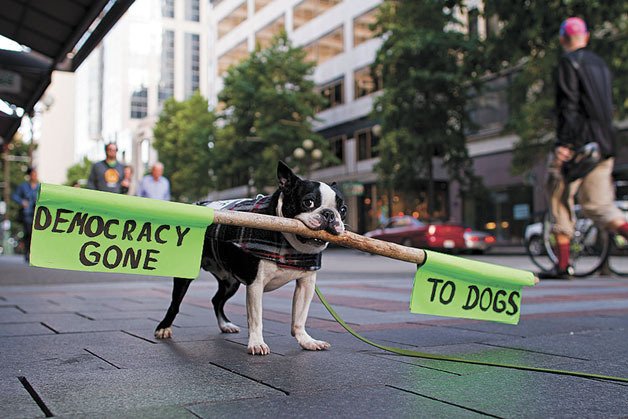They don’t have a leader, but hot dog, what a mascot.
Inspired by Occupy Wall Street and the “Occupy” demonstrations in large cities across the country, dozens of South Whidbey residents have been gathering each week to map out how they, too, can make a difference.
Later this week, members of “Occupy South Whidbey” will gather for its first political action: a sidewalk protest outside the Chase Bank branch in Freeland.
According to Occupy South Whidbey member Jim Hyde, the protest is meant to draw attention to the massive profits of Chase — $4.26 billion in the third quarter of 2011 alone, he said — and the financial giant’s role in the ongoing financial crisis. The demonstration starts at 3 p.m.
Hyde, in an earlier interview, said the Occupy movement does not have specific goals, and is not unified around a political party or a leader.
“There are some general ideas, like restoring control of the democracy to people, the 99 percent, and getting the corporations out of government,” he said.
“So that obviously involves reversing corporate personhood,” Hyde said, referring to the Supreme Court decision that lifted restraints on corporate donations to political campaigns.
Occupy South Whidbey got its start after a group of South End residents participated in a protest in Coupeville that encouraged people to pull their money out of major banks to show their discontent with the Wall Street bailout and the political influence of big money.
The group has been meeting each Monday night at Bayview Community Hall. About 30 people came to the first meeting, and the crowd has been growing since, with some new, and some returning, members.
Hyde said people are upset with the ineffectiveness of the current political system.
“People are fed up with corporate control of government. They want a voice,” he said. “They aren’t happy with the economic situation, the disparity, the shrinking middle class.”
Occupy South Whidbey, like its national namesake, is also leaderless by design, he said.
“It’s really about the 99 percent,” he said. “It’s non-partisan. It’s not about being a Democrat or a Republican or any other political affiliation. We’re all victims of the economic problems, except the 1 percent,” he said.
The aim is to support the Occupy movement at home and abroad, he said. So far, the goals have been vague.
“That’s probably a good thing,” Hyde added. “If we get too specific, we won’t be the 99 percent anymore.
“Our goal is to include all the people who are basically fed up with the way the country’s being run and the way the economic system is leaving them out of the benefits of our society,” he said.
Frankie Petitclerc became involved in the first Occupy protest in Seattle, which was also held outside a Chase bank but ended up with protesters getting pepper sprayed by Seattle police.
The anger is real, she said.
“Banks got bailed out, we got sold out,” she said.
Petitclerc said the Occupy movement has helped people realize they need to be heard.
“There’s just so many issues that people are upset and angry about, and it gives them a voice,” she said.
“Legislators don’t lead, they follow,” she added. “They need to be pushed by a lot of people to make them make a change.”
Despite the seriousness of the Occupy message, there have been lighter moments for the protest movement.
Thank Mugsy for that.
Mugsy is Petitclerc’s 6-year-old Boston terrier, who has become an unofficial mascot of sorts for the Occupy movement in the region. Photographs of the dog carrying protest signs have appeared almost everywhere, from the Seattle Times to the top pick on websites that have run Occupy news.
At one Seattle protest, a small mob gathered around Mugsy to take his photo.
“He was like Mr. Rock Star,” Petitclerc said.



